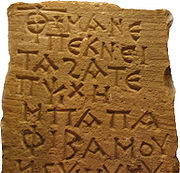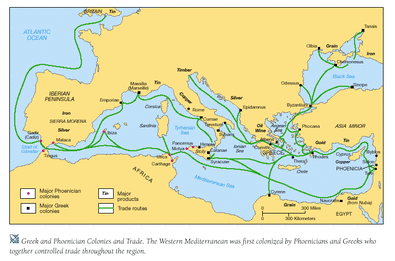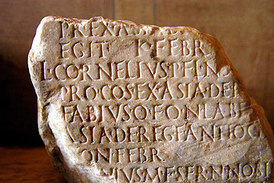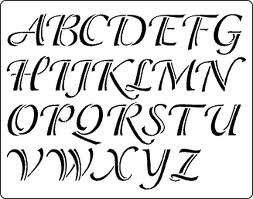The Phoenician Alphabet
Society and the Alphabet
While the Phoenician alphabet was easier to learn than cuneiform, many people were still illiterate. Reading and writing was limited to merchants, traders, scribes, priests, kings, and wealthy people. In most cases, only men were taught to read and write. The ability to read and write showed a degree of wealth, class, power, and status. It was not until modern times that it became more common for both men and women to be literate.
In societies, having one common language made it easier for people to communicate with one another; thus making the society more efficient. With the new found efficiency the civilizations could grow and prosper like never before, spreading their influence over a greater area.
In societies, having one common language made it easier for people to communicate with one another; thus making the society more efficient. With the new found efficiency the civilizations could grow and prosper like never before, spreading their influence over a greater area.
The Greek Alphabet

Greek version of the Phoenician alphabet.
Phoenician sea traders often traded a valued purple clothing dye, carved ivory, colorful glass, textiles, and metal jewelry with the Greeks. The Phoenicians not only took with them goods, but also their alphabet.
When the Greeks adopted the Phoenician alphabet, they added vowels to it. The amount of intellect in the Greek society made the alphabet a bigger achievement than with the Phoenicians. Philosophers and other intellectuals such
as Socrates, Plato, Euclid, Hippocrates, and Pythagoras were able to record their achievements using the alphabet, making their thoughts and discoveries easier to understand and more well-known. Also, literature by Homer such as the Illiad and the Odyssey were written using this alphabet, making the material simpler to understand and easy to translate.
The Greeks were not the only ones to adopt the Phoenician alphabet. The Etruscans, and later the Romans, also adopted it.
When the Greeks adopted the Phoenician alphabet, they added vowels to it. The amount of intellect in the Greek society made the alphabet a bigger achievement than with the Phoenicians. Philosophers and other intellectuals such
as Socrates, Plato, Euclid, Hippocrates, and Pythagoras were able to record their achievements using the alphabet, making their thoughts and discoveries easier to understand and more well-known. Also, literature by Homer such as the Illiad and the Odyssey were written using this alphabet, making the material simpler to understand and easy to translate.
The Greeks were not the only ones to adopt the Phoenician alphabet. The Etruscans, and later the Romans, also adopted it.
The Roman Alphabet
Early Rome was ruled by the Etruscans. As Rome became sovereign, it experienced various cultural exchanges with Greece through trade and war. One such exchange was of the alphabet.
The Romans, like the Greeks, modified the Phoenician alphabet. Overtime, the adapted Roman alphabet became known as the Latin alphabet, which became the base of modern of various alphabets used today. Rome's biggest acccomplishment was its great expasnsion and continuously conquering land. It is easier to acquire people into one's civilization if there is an efficient way to communicate their intentions. |
The English Alphabet
The modern-day English alphabet is a descendant of the Phoenician alphabet. After many modifications made by the Greeks, the Romans, and others, it became what we know today. The efficiency of the alphabet system allowed its existence to surpass the majority of the other forms of recordkeeping. The alphabet's easy-to-use quality has made it easier for others throughout history to adjust to and adapt it into their own culture.
Works Cited
"Phoenician Alphabet Origin." Phoenician.org. N.p., n.d. Web. 03 Oct. 2012. <http://www.phoenician.org/alphabet.htm>.
"Phonetic Alphabet." Madison Clarke's Porfolio. N.p., n.d. Web. 02 Oct. 2012. <http://madisonclarke.wordpress.com/2011/03/page/2/>.
"The Latin Alphabet." N.p., n.d. Web. 03 Oct. 2012. <http://mysite.du.edu/~etuttle/classics/latalph.htm>.
"The Phoenician Alphabet." N.p., n.d. Web. 03 Oct. 2012. <http://suite101.com/article/the-phoenician-alphabet-a39076>.
"Latin Alphabet." Wikipedia. Wikimedia Foundation, 10 Apr. 2012. Web. 05 Oct. 2012. <http://en.wikipedia.org/wiki/Latin_alphabet>.
"(13) The Origin of Alphabets and the Languages of the World." N.p., n.d. Web. 05 Oct. 2012. <http://www.encyclopediaofauthentichinduism.org/articles/13_the_origin_of.htm>.
"Phonetic Alphabet." Madison Clarke's Porfolio. N.p., n.d. Web. 02 Oct. 2012. <http://madisonclarke.wordpress.com/2011/03/page/2/>.
"The Latin Alphabet." N.p., n.d. Web. 03 Oct. 2012. <http://mysite.du.edu/~etuttle/classics/latalph.htm>.
"The Phoenician Alphabet." N.p., n.d. Web. 03 Oct. 2012. <http://suite101.com/article/the-phoenician-alphabet-a39076>.
"Latin Alphabet." Wikipedia. Wikimedia Foundation, 10 Apr. 2012. Web. 05 Oct. 2012. <http://en.wikipedia.org/wiki/Latin_alphabet>.
"(13) The Origin of Alphabets and the Languages of the World." N.p., n.d. Web. 05 Oct. 2012. <http://www.encyclopediaofauthentichinduism.org/articles/13_the_origin_of.htm>.



